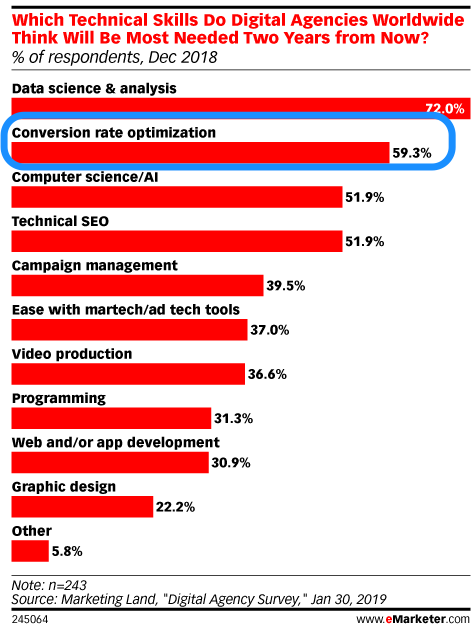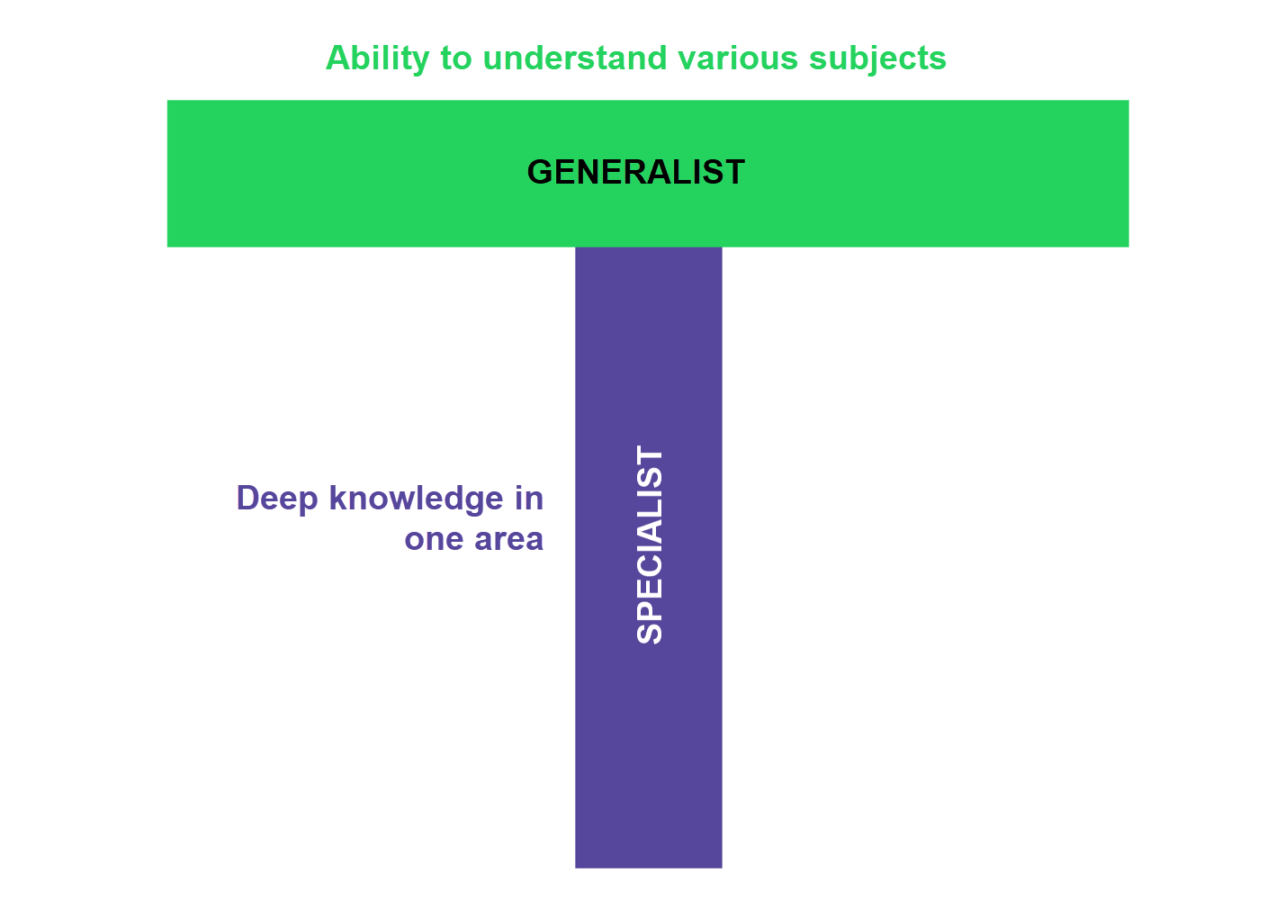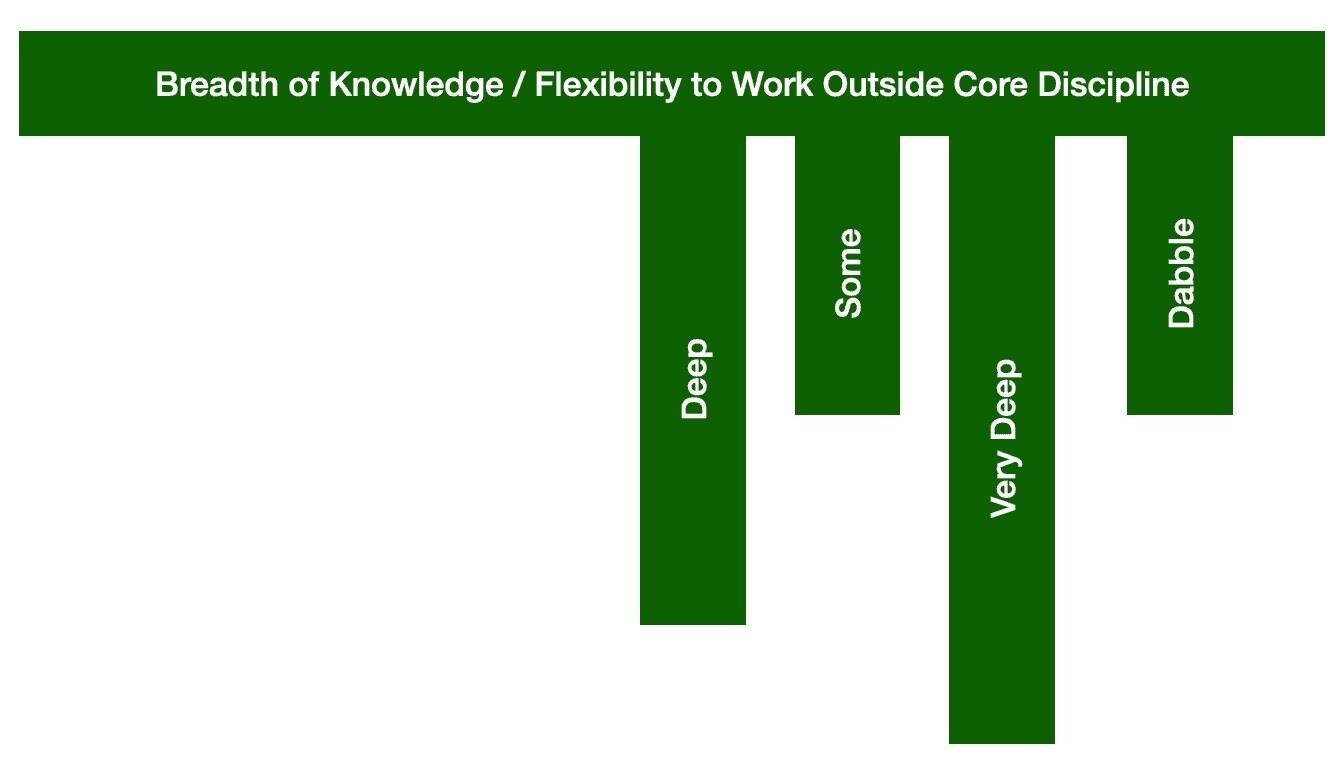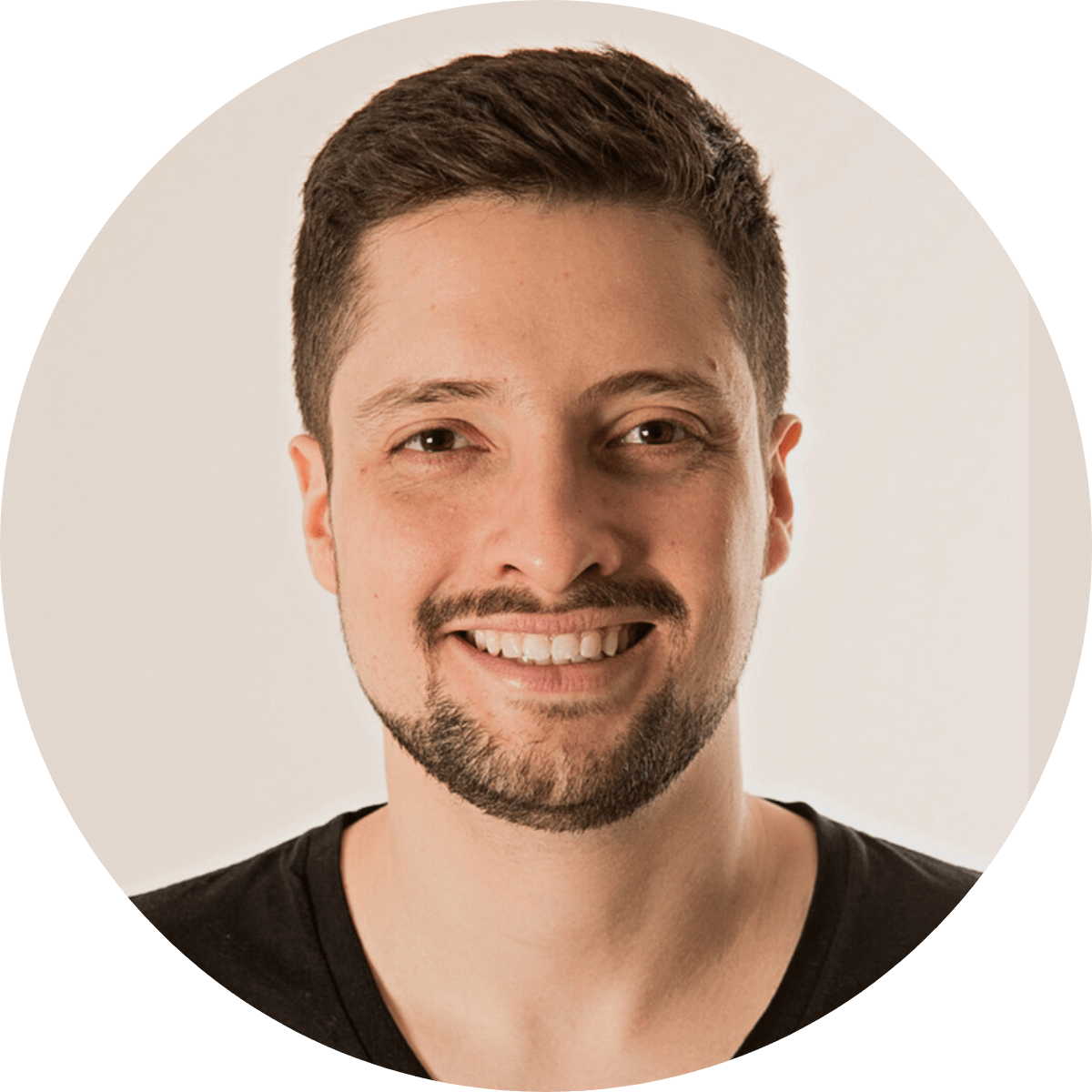In This Guide:
- Why is it Challenging to Hire CRO Specialists?
- What are the Ideal Qualities of CRO Specialists?
- Which Skills are Required for CRO Specialists?
Why is it Challenging to Hire Conversion Rate Optimization Specialists?
If you plan to specialize in Conversion Rate Optimization (CRO) or are thinking of hiring a professional in the field, get ready for some challenges.
The Demand Is High
Developing a workforce that has skills in Conversion Optimization and Experimentation is something many companies desire today.
In a survey released by eMarketer in 2019 (which, to me, seems to have hit the nail on the head about how things are today), CRO was the second most mentioned competence among the most needed skills in digital agencies:

The fact that leading companies in the world's most competitive segments are increasingly investing in CRO also helps to boost the market. After all, in addition to competing for talent among themselves, these companies tend to have their strategies copied by many others, which naturally makes the talents being sought after scarce.
But the current high demand is not exclusive to CRO, is it? We can say the same about Data Science, Digital Analytics, Web Development, and a bunch of other segments in Marketing and Technology.
The main issue is that the demand for CRO is particularly higher than the amount of talent supply.
You can sell out national events for data scientists, for instance. But good luck trying to get enough CRO professionals to fill a room.
📕 Related: What's All The Hype About "Experimentation"?
Scarcity Harms the Market
Don't get me wrong. I'm not celebrating scarcity because it makes me stand out as a professional in the field. Quite the contrary. The level of imbalance between supply and demand today is bad for the market.
More and more often, I see or hear of companies that are desperate to find CRO talent — but they are making a lot of mistakes in the process.
Here's a common scenario:
Companies hire the first junior professional they meet and assign them to an impossible task. They hope this employee will — alone — magically increase the company's KPI conversion rates, going on to change everyone's lives. After all, that's what they do, right?
The problem obviously lies much deeper. We also need technology, processes, culture, and other human resources for a CRO professional to have a shot at delivering real results. And even if the company is already willing to make investments (they're rarely at this level of maturity), executing a solid plan correctly requires a certain CRO seniority that rarely exists in the market.
So this is the usual outcome caused by scarcity:
- Company hires employee in a desperate rush
- Employee does not find/create conditions to deliver results
- Employee becomes frustrated
- Company becomes frustrated
- CRO gets bumped down in the company's priority list ("CRO does not work. We've tried it here.")
That's why I'm writing this article. To guide CRO professionals in their development path, and, at the same time, help companies develop their internal talents in a sustainable way.
What are the Ideal Qualities of Conversion Rate Optimization Specialists?
At Supersonic, a consulting company I co-founded, we were CRO pioneers. We started in 2013, when almost no one in Brazil had even heard of CRO. So we knew from day 1 that we would need to qualify our team on our own. We invested a lot in developing and optimizing our training.
Nowadays, it's safe to say that no other place in the world trains as many CRO specialists as Supersonic does, whether it is to work in our squads or to work directly with clients who hire a training / allocation service.
Numerous hits and misses over the years have taught us a lot about how to identify promising qualities in a professional who wants to work with CRO.
Here are some of the most important insights we have gathered:
T-shaped? Not Enough. We Need Key-shaped.
A concept that has gained a lot of buzz in recent years as the "ideal modern professional" is known as T-shaped:

Basically, a T-shaped professional has the ability to accumulate general knowledge on several different topics (not going too deep), while being a great expert (with deep knowledge) in their main area of expertise.
Being T-shaped is great, but unfortunately it's not enough for CRO. CRO combines a whole range of subjects. If you want to achieve excellence in this field, you will need to develop plenty of knowledge — not just as a generalist — in very different areas. We will touch on this next.
So, instead of being T-shaped, or an expert in only one field, a good CRO professional needs to be Key-shaped.
Unsurprisingly, the term literally means being shaped like a key. It's a recent concept used to describe people who, similarly to T-shaped professionals, have a more general knowledge of various fields. But the difference is that they are able to delve into more than one area:

📕 Source: The shift between T-Shaped & Key-shaped employees
Academic Background?
Doesn't matter much. Honestly, I can't even remember off the top of my head what most CRO specialists I've ever managed or trained graduated in.
Precisely because of CRO's multidisciplinary quality, academic training prepares no one. Advertising professionals will need to learn statistics. Information Scientists will need to learn psychology.
Much more important than what the person majored in is how Key-shaped they are — knowledge in several distinct areas, more in-depth in some.
Too Much Confidence is a Bad Sign
Don't ask me why, but some people are often inclined to worship gurus. We pay too much attention to people who create millions of infallible "rules" and are so certain about their own opinions.
But the truth is that professionals who are full of certainties are actually just full of vices and fragile egos. And because CRO is such a transparent field when it comes to results, this type of professional usually doesn't thrive in it.
About 90% of the experiments run by some of the best companies in the world fail. Do you really think there's room for professionals who are full of exact certainties?
In CRO, this famous quote by Bertrand Russell makes a lot of sense:
"The fundamental cause of the trouble is that in the modern world the stupid are cocksure while the intelligent are full of doubt."
Or perhaps science fiction legend Isaac Asimov better sums up how incompatible experimentation and gurus are:
"Experimentation is the least arrogant method of gaining knowledge."
Another problem is that people who are full of certainties usually aren't very curious.Pretty much anyone can look at a website and say, "this is bad."
The difference between a mediocre optimization job and a good one is the method used to solve the problem.
- A person who is full of certainties will preach surface-level best practices without context.
- A curious person will work relentlessly to truly understand the root of a problem (in both quantitative and qualitative terms!) And with that, will be able to determine the best course of action to fix it with much more assertiveness.
At the end of the day, I'll always take CURIOUS over CONFIDENT.
Information Nerds
I like nerds in CRO. Maybe because I am one, too. But not necessarily nerds like die-hard Marvel fans (I'm not a fan myself... there, I said it).
The nerds that matter the most to CRO are the ones who have an endless desire to delve deeply into various subjects and information. Again, it's all about curiosity.
When I was younger, I made it a point to be the most well-informed person in my group of friends about any topic we geeked out about: that one game, that one movie, that one TV show, etc.
I see this same trait in many of the best CRO professionals I've ever met. Not only does it show curiosity, it's actually an indication that they are multidisciplinary. CRO professionals need to be specialists in a number of areas, besides understanding the products they sell better than anyone else.
Which Skills are Required for Conversion Rate Optimization Specialists?
We already know that being multidisciplinary is a must-have. But what specific subjects does a CRO professional need to know? We'll discuss them, but here's a disclaimer first:
Just to state the obvious, the specific needs of a CRO position will vary considerably according to factors such as the company's market segment, timing, and the rest of the support team. This will also affect the depth of knowledge required in each subject.
But, overall, these are the main areas in which CRO professionals should constantly seek knowledge (not necessarily in this order), along with the reason why each area is important:
Copywriting
In summary, copywriters need to sell products and services with excellence by using — mainly, but not only — text. But don't confuse "copywriting" with "writing good essays." They are completely different things. The vast majority of the best copywriters I know have never been actual writers.
To increase conversion rates, understanding topics such as the sales journey, positioning, and value proposition is much more important than having great grammar.
In most businesses, the main "levers" that increase conversion are related to elements of copywriting, to some extent. Headlines, clear benefits, competitive differentiation, etc. Therefore, a CRO specialist without in-depth knowledge of copywriting will have limited impact.
Digital Analytics
Every Digital Marketing professional needs to have a solid understanding of Digital Analytics to perform at a high level. It wouldn't be any different in CRO. To avoid acting like the gurus I mentioned earlier, listing random "best practices," a CRO professional needs to accurately diagnose the problems happening with a website or product, and only then figure out how to solve them.
Where are the biggest gaps in the conversion funnel? Which elements are causing friction for users? What features are popular with the most engaged users?
Hundreds of valuable questions like these will only be asked and answered if you have a good background in Digital Analytics.
📕 Related: What is Hotjar Used For and How Does it Work?
Audience Research
While Digital Analytics tells us what is going on, surveys with the audience will tell us why this is happening.
Why are this many people leaving the site at checkout? Why don't users come back after the third day of trial? Why is the LTV dropping?
The best hypotheses in experimentation arise when Digital Analytics and research data from the audience are analyzed together to get a full picture of what is working or not with our customers.
📕 Related: Audience Insights Boost Organic Blog Traffic +869%
UX Design
A major roadblock to conversions is faulty design, which creates unnecessary difficulties for users.
It's not the "beauty" of design that matters. If something gets redone just to look prettier but creates more distractions and complexities for the user, the conversion rate will most likely drop.
It is all about designing interfaces that solve users' problems in the most efficient way possible, creating the least amount of friction. Even if they work side by side with a designer, CRO professionals should be able to lead projects focusing on the most efficient design and best usability possible.
Statistics
Oh, statistics. Hated by many, but increasingly intertwined with everything in the world we live and work in today.
I see frequent atrocities in all knowledge areas that have been mentioned up to this point. But there's something special about statistics. Not to mention quite dangerous. After all, someone who is not data-driven is pretty bad. But someone THINKING they are data-driven when they actually misinterpret data and make decisions based on fake numbers is much, much worse.
With or without the support of statisticians, CRO professionals need to know the "basics," like correctly planning a valid test and correctly interpreting its results. Modern testing tools export visual reports that make it seem really simple, but it's not always a simple process.
Communication & Soft Skills
As mentioned earlier, if the testing culture is non-existent, CRO professionals have a limited potential to make actual impact. Therefore, they need to master soft skills that allow them to engage other people and departments.
Presenting test results in an exciting way, or engaging more people to start running their own tests can be big challenges. But they can also bring huge benefits.
To make this possible, a good CRO professional will need to communicate very well.
In Conclusion
The demand for CRO is on the rise. It is growing much faster than the available supply. The only way out of this shortage is to train new talent in the field.
On one hand, professionals need to get qualified the right way, understanding how multidisciplinary the field is and betting on learning the right skills.
On the other hand, companies need to stop thinking that by hiring any professional in a given field will magically make them achieve their goals. A more efficient approach would be to provide adequate support to talent training with the right technical guidance. This way, they can start implementing a culture of experimentation, and only then achieve real results.
In this article, I tried to help both sides of the coin by showing what professionals need to aim for and how companies can identify and develop the most promising talent.
Want more in-depth content about CRO talent training/hiring in the future? Or has any topic of your interest been left out of this conversation? Reach out to me on Twitter (@rafaeld) or on LinkedIn with your suggestions. I read and answer them all!



